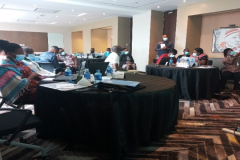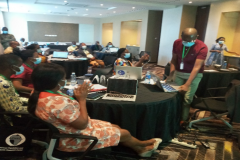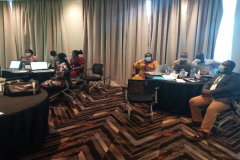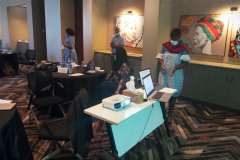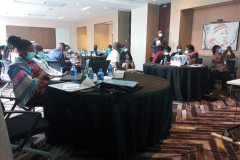Venue: ULWAZI PLACE African Population and Health Centre
Date: 18th – 22nd January 2021
Introduction:
Ghana has made significant strides in eliminating vaccine preventable diseases. Since 2003, thousands of children have been saved from maternal & neonatal tetanus, measles and polio as a result of timely vaccination. By 2018 Ghana’s coverage of immunization using penta 3 as proxy was 97%. Ghana has been among leading countries in Africa in coverage of immunization and is currently using13 vaccines with Gavi’s support. Despite the remarkable progress in coverage, there exist financing gaps that require critical attention from the government if the SDG 3 and other international and national policies such as the WHO regional strategic plan for immunization – (2014 – 2020), the Comprehensive multi-Year Action Plan (2020-2025), the Addis Declaration on immunization, the Abuja declaration and political commitment are to be achieved. All these treaties enjoin member states to move from globally driven immunization agendas to nationally owned immunization programs with increased national budget allocations and political commitments.
The role of civil society organizations (CSOs) in contributing to shaping government policies have over the years proven successful in many areas of Ghana’s development paradigm. Importantly cementing successes of the expanded program on immunization (EPI) and achieving universal health coverage (UHC) have been key actions of both the West Africa AIDS Foundation (WAAF) and many other health focused CSOs in Ghana over the years. The 2020 advocacy activities of WAAF through the Immunization Advocacy Initiative Ghana, aims at advocating for increasing of health budget with prioritization for immunization. The initiative has two outcomes 1: Sustaining annual financing for immunization by the Government of Ghana, and 2: Increased disbursement of the proportion of budget allocated to immunization by the Government of Ghana.
Capacity building in proposal writing
As part of building a sustainable advocacy force in achieving the stated outcomes of the initiative, The African Population and Health Centre (APHRC), Kenya in November 2020, organized a five-day grant proposal writing workshop for Consortium members i.e. SEND Ghana, Hope for Future Generations (HFFG) Consortium and Ghana National Coalitions of NGOs in Health (GNCH). The training took place at the APHRC Premises (Ulwazi Place). 17 representatives from partner organizations including the West Africa AIDS Foundation, a key member of the initiative in Ghana, participated in the training.
Participants were taken through various stages of proposal development, from Overview of Grants to proposal writing; Identifying relevant calls and Funders; Problem Statement, goals and objectives; Implementation Plan/Method; Budget, Risk Management and Sustainability; Project Evaluation and dissemination Plan; Title, Abstract, Cover Letter, Appendices and Submitting Application and Building Relationship with Funders. WAAF through this training has gained enhanced knowledge and capacity in Grant writing and is in a better position to apply for funding sustainably through grant writings and networking. This will ensure its sustainability not only in immunization, but in achieving its vision of remaining a key player of the global effort to develop and support individuals, communities and nation.


